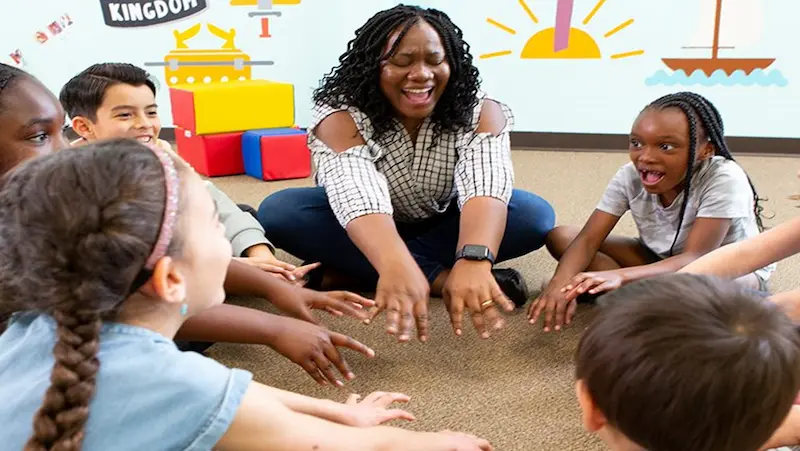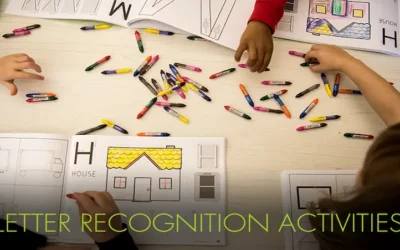In the realm of learning, where faith takes flight,
Sunday School lessons guide young hearts aright!
Engaging Sunday School lessons for kids blend the power of faith and learning, nurturing young hearts to grow in wisdom and grace. These lessons create a vibrant atmosphere where children actively participate in their spiritual journey, fostering a deep connection with God and His teachings.
Through interactive activities, captivating stories, and meaningful discussions, children explore biblical principles, life lessons, and moral values. Sunday School becomes a space where curiosity is ignited, questions are welcomed, and friendships are formed, all in the context of a loving and supportive community.
These lessons inspire children to embrace their unique identities as beloved children of God, empowering them to live out their faith in their daily lives. As they grow in knowledge and understanding, they develop a firm foundation that shapes their character, equipping them for a lifetime of spiritual growth and service to others.
Table of contents
Introduction
Sunday school education plays a pivotal role in nurturing children’s faith and character development. It provides a dedicated space for children to explore their spirituality, learn about biblical principles, and develop a personal relationship with God.
Engaging and interactive lessons in Sunday school have numerous benefits for kids. They create an environment where children actively participate, fostering their curiosity and love for learning. Through hands-on activities, discussions, and storytelling, children grasp abstract concepts in a relatable manner, making the lessons memorable and impactful.
These interactive methods also encourage critical thinking skills for kids, empathy, and moral reasoning, shaping their character and helping them navigate life’s challenges with wisdom and grace. Furthermore, the sense of community and support found in Sunday school fosters friendships and provides a nurturing space for children to grow spiritually and emotionally.

Bible Stories and Characters
Some of the Popular Bible Stories for Children are:
1. Noah’s Ark: God instructs Noah to build an ark and gather animals before a great flood. Key takeaway: God’s faithfulness and protection.
Interactive idea: Create a mini-ark craft activity where children can construct and decorate their own arks using various materials.
2. David and Goliath: David, a young shepherd, defeats the giant warrior Goliath with a single stone. Key takeaway: God’s strength in unexpected ways.
Interactive idea: Organize a friendly “David vs. Goliath” relay race where children complete challenges to symbolize overcoming obstacles.
3. Jonah and the Whale: Jonah is swallowed by a whale after trying to run away from God’s command. Key takeaway: God’s mercy and the importance of obedience.
Interactive idea: Set up a dramatic play area with a large fabric “whale” where children can take turns pretending to be Jonah and experience being inside the belly of the whale.
4. The Good Samaritan: A compassionate stranger helps a wounded man ignored by others. Key takeaway: Showing kindness and love to everyone, regardless of differences.
Interactive idea: Arrange a role-playing activity where children act out different scenarios, demonstrating acts of kindness and discussing how they can help others in need.
5. The Parable of the Prodigal Son: A son squanders his inheritance but is lovingly welcomed back by his forgiving father. Key takeaway: God’s unconditional love and forgiveness.
Interactive idea: Create a craft project where children design and decorate “welcome home” signs to symbolize the joy of reconciliation and forgiveness.
By incorporating crafts, role-playing, and hands-on activities, these stories become memorable experiences for children, deepening their understanding of the lessons and allowing them to connect with the stories on a personal level.

Life Lessons and Values
Use positive discipline strategies to guide children toward understanding the core values taught in Sunday School. Employ encouraging good behavior techniques and share parenting quotes that resonate with the lessons, reinforcing the positive behaviors you’re teaching.
Some Essential Values and Life Lessons from Biblical Teachings are as follows:
1. Love and Kindness: Teach children to love one another, show kindness, and treat others as they would like to be treated. Practical example: Encourage children to perform acts of kindness, such as writing thoughtful notes or helping someone in need.
2. Honesty and Integrity: Emphasize the importance of honesty and integrity in all aspects of life. Practical example: Play a game where children have to make honest choices and discuss the impact of honesty on relationships and trust.
3. Forgiveness: Teach children to forgive others and seek forgiveness when they have done wrong. Practical example: Engage in role-playing scenarios where children practice forgiveness and learn the healing power it brings to relationships.
4. Compassion and Empathy: Encourage children to show compassion and empathy towards others, putting themselves in someone else’s shoes. Practical example: Engage in community service projects or volunteer activities that expose children to different perspectives and encourage empathy.
5. Gratitude: Instill gratitude by teaching children to appreciate the blessings in their lives and express thankfulness. Practical example: Have children keep a gratitude journal where they write down things they are grateful for each day.
Instilling these values at a young age has a profound positive impact on children. It helps shape their character, develops empathy, and builds strong moral foundations. Children who embrace these values are more likely to develop healthy relationships, make responsible choices, and contribute positively to their communities. By understanding and applying these values in their lives, children become compassionate and principled individuals, prepared to navigate life’s challenges with grace and integrity.

Interactive Activities and Crafts
Engaging Sunday school lessons for kids are essential for nurturing their faith and promoting learning in a meaningful and enjoyable way. Incorporate a variety of activities for kids into your Sunday School curriculum. From drawing for kids to engaging in art projects for kids, these activities can help children grasp and internalize the lessons in a fun and creative manner. Storytelling and short stories for kids about moral values can captivate their attention and leave a lasting impact.
Here are some ideas for creating engaging Sunday school lessons that combine faith-building with interactive learning experiences:
1. Welcome and Icebreaker (10 minutes):
● Begin by greeting the children and engaging in a short icebreaker activity. For example, you can ask each child to share their favorite thing in nature and why they like it.
2. Nature Walk and Observations (20 minutes):
● Take the children on a short nature walk around the church premises or a nearby park.
● Encourage them to observe and collect items from nature, such as leaves, rocks, or flowers.
● After the walk, gather the children in a circle and ask them to share what they found and why they think God created those things.
● Discuss the concept of stewardship and how we can take care of the environment.
3. Acts of Kindness (15 minutes):
● Divide the children into pairs or small groups.
● Provide each group with a list of kind acts, such as smiling at someone, helping with chores, or writing a thank-you note.
● Instruct the children to choose one act of kindness from the list and act it out.
● Afterward, encourage them to share their experiences and discuss how it felt to show kindness.
4. Craft: Helping Hands (15 minutes):
● Provide each child with a paper cutout of a hand or have them trace their own hand on construction paper.
● Instruct them to decorate the hand cutout with drawings or words that represent acts of kindness.
● Help the children attach their decorated hands to a poster board or display them on a classroom wall.
● Explain that this serves as a reminder to show kindness to others throughout the week.
Interactive lessons often include discussions and activities that prompt children to reflect on their own lives and apply the teachings to their daily experiences. This helps them connect biblical principles with real-life situations and develop a practical understanding of their faith.
By incorporating interactive elements and engaging activities into Sunday School lessons, educators can create an environment that nurtures both the faith and learning of children, fostering a lifelong love for God and a deeper understanding of their beliefs.

Songs, Rhymes, and Games
Popular Songs and Rhymes for Sunday School Lessons are:
1. “This Little Light of Mine”: This upbeat song encourages children to let their light shine and share God’s love with others. It reinforces the lesson of being a positive influence in the world.
2. “Jesus Loves Me“: A beloved classic, this song reminds children of God’s unconditional love for them. It teaches the fundamental message of God’s love and care for each individual.
3. “Father Abraham“: This lively song engages children in physical movements as they mimic the actions of Father Abraham. It reinforces the concept of faith and obedience while making learning interactive and fun.
4. “Deep and Wide“: This catchy song teaches children about the depth and width of God’s love.
5. Bible Verse Rhymes: Creating rhymes or chants for memorizing Bible verses makes the learning process enjoyable and easier for children. Incorporate catchy rhythms and hand gestures to enhance engagement.
Here are some popular games that kids can enjoy in Sunday School:
– Bible Trivia: Organize a Bible trivia game to test children’s knowledge of biblical stories, characters, and teachings. Provide rewards or incentives to make it exciting and encourage friendly competition.
– Charades: Play Bible-themed charades where children act out a biblical character or story while others guess. This interactive game promotes creativity, teamwork, and understanding of the stories.
– Scavenger Hunts: Create scavenger hunts based on Bible stories or verses. Children search for hidden clues or objects that relate to the story, fostering problem-solving skills and reinforcing the lessons.
– Memory Verse Games: Turn memorizing Bible verses into a game by using flashcards, puzzles, or interactive apps. Make it a challenge and celebrate achievements to motivate children. Break the verse into shorter phrases and have children memorize one phrase each day. Encourage them to recite the entire verse correctly by the end of the week or month, rewarding their efforts.
– Musical Crafts: Combine music and crafts by creating musical instruments together. Examples include making shakers with rice-filled bottles, drums with empty containers, or guitars with rubber bands and shoeboxes. Once the instruments are made, encourage children to play them while singing songs or creating their own rhythms.
These activities make learning enjoyable and memorable for children in several ways:
1. Engagement: Music, rhymes, and games capture children’s attention and actively involve them in the learning process. They provide a multisensory experience that aids in information retention.
2. Fun and Creativity: These activities infuse an element of fun and playfulness into the learning environment. Children are more likely to remember and engage with lessons presented in an enjoyable and interactive manner.
3. Emotional Connection: Music and games evoke emotions, creating a stronger connection to the messages being conveyed. Children can relate to the lyrics, melodies, and movements, making the lessons more meaningful and relatable.
4. Reinforcement: Songs, rhymes, and games serve as reinforcement tools, helping children internalize and remember important Sunday school lessons. The repetition and interactive nature of these activities contribute to long-term retention.
Combining music and games in home or classroom settings makes learning enjoyable and memorable for children. It engages their senses, encourages active participation, and reinforces biblical teachings in a dynamic way. These interactive activities foster a love for music, strengthen bonds among children, and deepen their understanding of the Bible’s messages.

Parental Involvement and Support
Fostering open discussions and reflections on faith-related topics can create a safe and nurturing environment for individuals to share their thoughts, ask questions, and deepen their understanding. Here are some tips to facilitate such discussions:
1. Establish a Safe and Respectful Environment:
a. Create a safe space where everyone feels comfortable expressing their opinions and beliefs without fear of judgment or ridicule.
b. Emphasize the importance of respecting different perspectives and encourage active listening.
2. Create a Non-Judgmental Atmosphere:
a. Emphasize that discussions are meant to explore and learn from one another, rather than debating or proving someone wrong.
b. Remind participants that it’s acceptable to have differing opinions and that respectful disagreement is a part of healthy discussions.
3. Follow-Up and Continued Engagement:
a. Encourage individuals to continue reflecting and exploring faith-related topics outside of the discussion setting.
b. Offer follow-up opportunities, such as book clubs, study groups, or ongoing discussion sessions, to foster continued engagement and growth.
By implementing these tips, you can create a supportive and enriching environment for open discussions and reflections on faith-related topics. Remember to adapt the approach to the specific needs and dynamics of the group.
Remember to adjust the lesson based on the age group and available resources. The objective is to provide a balanced mix of storytelling, interactive activities, and creative expression to help children engage with the lesson and deepen their understanding of God’s creation and our role as stewards.

Conclusion
Engaging Sunday School lessons for kids create a dynamic environment where faith and learning intertwine. Through interactive activities, memorable songs, and engaging games, these lessons nurture children’s faith and foster a love for God’s teachings.
The incorporation of music, rhymes, and games enhances their understanding and retention of biblical messages, making learning enjoyable and memorable.
By instilling essential values, promoting character development, and providing a supportive community, Sunday School empowers children to grow spiritually, develop strong moral foundations, and apply their faith in their daily lives. These engaging lessons lay the groundwork for a lifelong journey of faith, learning, and service to others.
Also, BrightChamps provides a comprehensive platform for learning about money for kids, offering interactive and engaging resources that teach financial literacy, budgeting, saving, and other essential money management skills.
Frequently Asked Questions
Sunday school provides children with a strong spiritual foundation by teaching them about God. It introduces them to the core beliefs and values of their faith and helps establish a personal relationship with God from an early age.
Sunday school lessons can be adapted to different age groups, but typically they are designed for children ranging from preschool to early adolescence.
Look for children’s Bible story books specifically designed for different age groups. Many churches provide age-appropriate materials for children, including Bible storybooks, curriculum, and online resources. Numerous websites, local bookstores, online retailers, or your local library and apps offer age-appropriate Bible stories and resources for children.
By incorporating these strategies, Sunday school lessons and activities can create an inclusive environment where children from different faith backgrounds feel respected, valued, and included. It promotes an atmosphere of curiosity, understanding, and learning about diverse spiritual perspectives.
Here are some interactive activities that are suitable for preschoolers and elementary-aged children:
1. Scavenger Hunt: Create a list of items or clues for the children to find around the house or in a designated area. This activity promotes problem-solving skills and active engagement.
2. Sensory Play: Set up sensory bins with materials like sand, water, rice, or beans. Add tools, toys, or objects for children to explore and manipulate with their senses.
Sunday school lessons capture children’s attention and keep them engaged. By incorporating various activities, visuals, and interactive elements, the lessons become more exciting and enjoyable. This helps children stay focused and attentive, leading to better comprehension and retention of the lesson content.
Yes, parents to be actively involved in their child’s Sunday school education as they can reinforce the values and teachings learned in the classroom. They can have discussions with their children about the lessons, provide additional context or examples, and help connect the teachings to everyday life.
There are numerous resources available to supplement Sunday school lessons at home. Here are some suggestions:
– Online Resources: You can find printable worksheets, coloring pages, quizzes, and craft ideas related to specific stories or themes.
– Websites and Apps: Many churches provide online resources, including recorded sermons, children’s messages, and downloadable materials for families.
Sunday school lessons help children develop moral values by teaching them biblical principles, promoting empathy, compassion, kindness, honesty, forgiveness, and providing practical examples and discussions for applying these values in their lives.
Yes, there are several online platforms and apps that offer additional Sunday school resources, such as Life.Church Open Network, Superbook Kids Bible App, and Ministry-To-Children.com.


 We are an army of educators and passionate learners from BrightChamps family, committed to providing free learning resources to kids, parents & students.
We are an army of educators and passionate learners from BrightChamps family, committed to providing free learning resources to kids, parents & students.
























